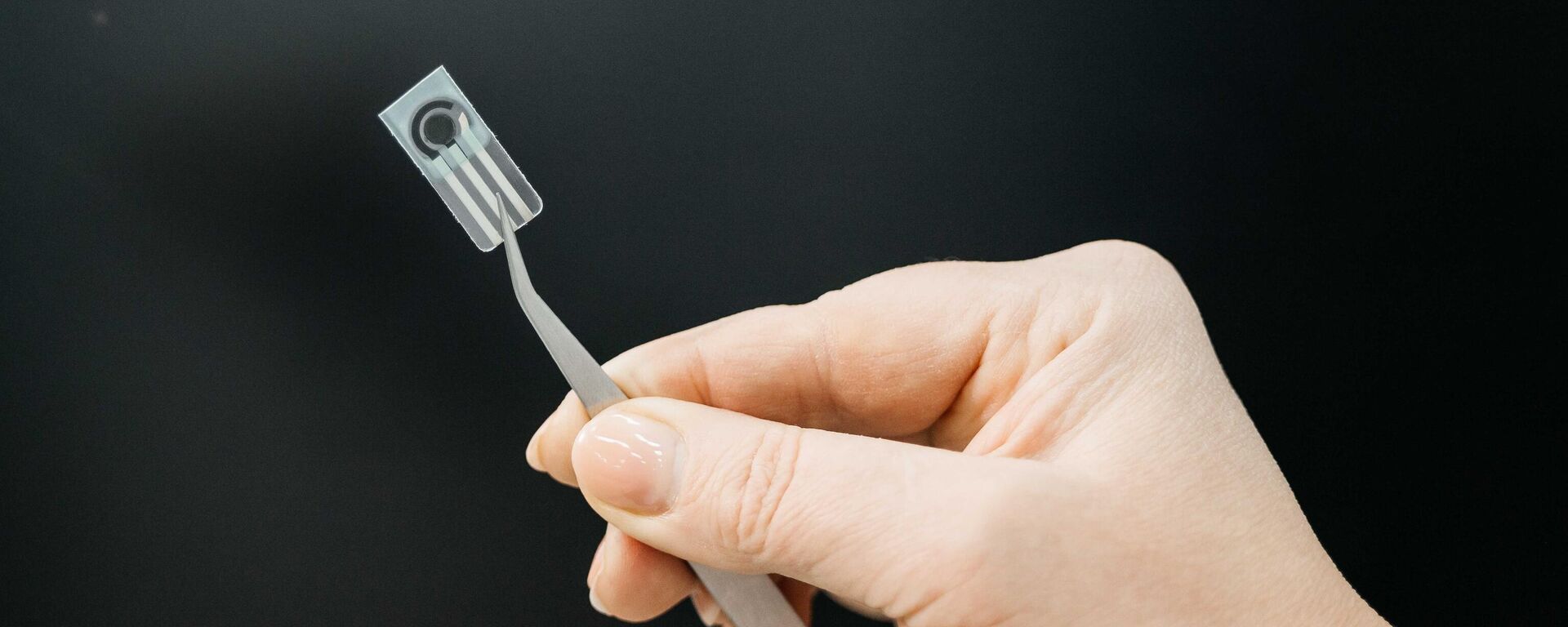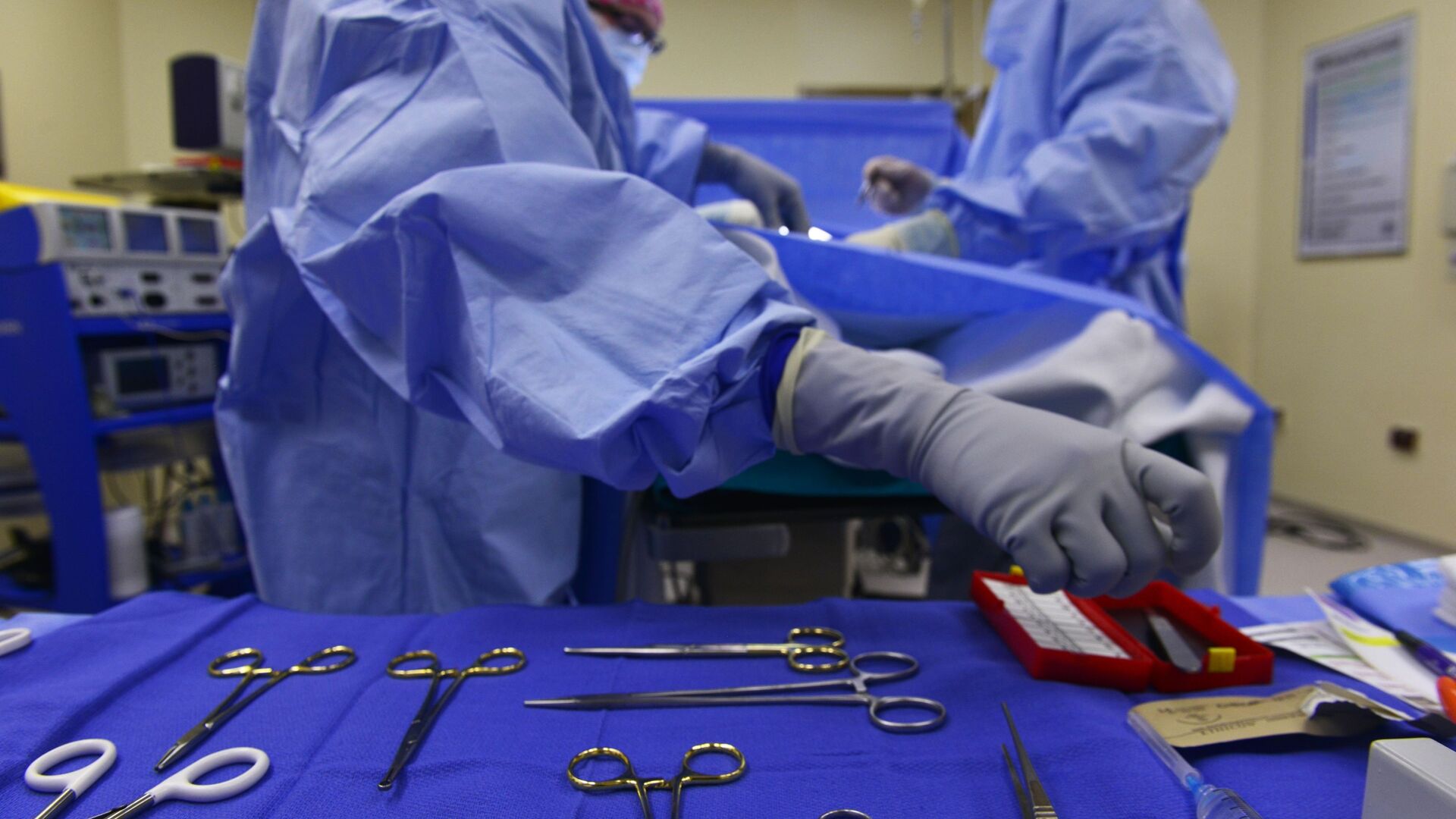https://sputnikglobe.com/20250428/russian-scientists-develop-mini-lab-for-emergency-and-intensive-therapy-care-1121948089.html
Russian Scientists Develop Mini-Lab For Emergency And Intensive Therapy Care
Russian Scientists Develop Mini-Lab For Emergency And Intensive Therapy Care
Sputnik International
Scientists from Saratov State Medical University have developed a mini-laboratory for non-invasive blood analysis.
2025-04-28T14:45+0000
2025-04-28T14:45+0000
2025-04-28T17:58+0000
beyond politics
russia
saratov
science & tech
medicine
https://cdn1.img.sputnikglobe.com/img/07e5/07/17/1083447042_0:131:3073:1859_1920x0_80_0_0_3d2c1e8303be0bca7fa2ab6c2826a4d6.jpg
According to the developers, this portable device will allow emergency physicians and intensivists to measure hematocrit (the ratio of total blood volume to red blood cell volume) and monitor blood viscosity during the patient’s transportation without waiting for lab results. The university emphasizes this is particularly critical for severe surgical patients. In trauma, burns, hemorrhages, and acute abdominal conditions, such patients often develop hypovolemia - a mismatch between circulating blood volume and vascular capacity leading to severe complications. Key indicators of hypovolemic disorders are blood viscosity and hematocrit (the percentage of red blood cells per blood volume unit). However, current measurement methods require blood sampling. Researchers at V.I. Razumovsky Saratov State Medical University (Saratov, Russia) have created a device they describe as a mobile mini-lab. Its operation is based on analyzing pulse waves in the brachial and radial arteries. Beyond blood viscosity and hematocrit, the device uses two sensors to measure in real time the vascular wall elasticity, the heart rate, and the blood pressure.Project lead Oleg Tsarev, professor at the Department of Hospital Surgery, explained to Sputnik that these parameters alert physicians to fluid deficiency-related hypovolemic disorders and indicate the likelihood of a fatal event occurring from the cardiovascular system (cardiovascular risk). In practice, EMS physicians cautiously administer IV fluids without full cardiac function data. As the professor noted, due to this, during transportation to the hospital, patients with intestinal obstruction are either not given intravenous infusions at all or receive no more than 400 ml, whereas one and a half to two liters are needed. As a result, irreversible kidney dysfunction occurs. WHO data shows ~20% of global deaths result from inadequate pre-hospital care. Professor Tsarev believes timely prehospital volemic correction effectively constitutes preoperative preparation for intestinal obstruction cases. Moreover, as the doctor believes, the developed intelligent system will be useful not only in the prehospital stage but also in the hospital, as even in the intensive care unit, blood sampling and its further analysis to obtain information about hypovolemic disorders lead to time loss, which the intensivist cannot afford — hypovolemia correction must begin immediately, and its adequacy must be continuously monitored.
https://sputnikglobe.com/20250313/russian-scientists-find-a-way-to-predict-bulimia-and-anorexia---1121634526.html
https://sputnikglobe.com/20250125/what-unites-chekhov-gorbachev-and-bioengineering-moscow-state-university-1121493383.html
https://sputnikglobe.com/20241223/russia-develops-ultra-sensitive-sensor-for-detecting-pesticides-in-food-1121221047.html
russia
saratov
Sputnik International
feedback@sputniknews.com
+74956456601
MIA „Rossiya Segodnya“
2025
Sputnik International
feedback@sputniknews.com
+74956456601
MIA „Rossiya Segodnya“
News
en_EN
Sputnik International
feedback@sputniknews.com
+74956456601
MIA „Rossiya Segodnya“
Sputnik International
feedback@sputniknews.com
+74956456601
MIA „Rossiya Segodnya“
science in russia, medical science in russia, russia medicine, russian scientific progress
science in russia, medical science in russia, russia medicine, russian scientific progress
Russian Scientists Develop Mini-Lab For Emergency And Intensive Therapy Care
14:45 GMT 28.04.2025 (Updated: 17:58 GMT 28.04.2025) Scientists from Saratov State Medical University have developed a mini-laboratory for non-invasive blood analysis.
According to the developers, this portable device will allow emergency physicians and intensivists to measure hematocrit (the ratio of total blood volume to red blood cell volume) and monitor blood viscosity during the patient’s transportation without waiting for lab results.
The university emphasizes this is particularly critical for severe surgical patients. In trauma, burns, hemorrhages, and acute abdominal conditions, such patients often develop hypovolemia - a mismatch between circulating blood volume and vascular capacity leading to severe complications.
Key indicators of hypovolemic disorders are blood viscosity and hematocrit (the percentage of red blood cells per blood volume unit). However, current measurement methods require blood sampling. Researchers at V.I. Razumovsky Saratov State Medical University (Saratov, Russia) have created a device they describe as a mobile mini-lab.
Its operation is based on analyzing pulse waves in the brachial and radial arteries. Beyond blood viscosity and hematocrit, the device uses two sensors to measure in real time the vascular wall elasticity, the heart rate, and the blood pressure.
Project lead Oleg Tsarev, professor at the Department of Hospital Surgery, explained to Sputnik that these parameters alert physicians to fluid deficiency-related hypovolemic disorders and indicate the likelihood of a fatal event occurring from the cardiovascular system (cardiovascular risk).
He provided a clinical example: "Acute intestinal obstruction, with its high mortality rates, always involves hypovolemic disorders as fluid shifts from vasculature to intestines (up to 5-7 liters). While correcting these water-electrolyte imbalances requires lab tests, these aren't available during transportation."
In practice, EMS physicians cautiously administer IV fluids without full cardiac function data.
"If the heart can't handle the fluid load, pulmonary or cerebral edema may develop - an even graver danger," Tsarev noted.

25 January 2025, 17:49 GMT
As the professor noted, due to this, during transportation to the hospital, patients with intestinal obstruction are either not given intravenous infusions at all or receive no more than 400 ml, whereas one and a half to two liters are needed.
As a result, irreversible kidney dysfunction occurs.
"Therefore, time cannot be wasted during the transportation of such a patient," the doctor is convinced.
WHO data shows ~20% of global deaths result from inadequate pre-hospital care. Professor Tsarev believes timely prehospital volemic correction effectively constitutes preoperative preparation for intestinal obstruction cases.

23 December 2024, 04:30 GMT
Moreover, as the doctor believes, the developed intelligent system will be useful not only in the prehospital stage but also in the hospital, as even in the intensive care unit, blood sampling and its further analysis to obtain information about hypovolemic disorders lead to time loss, which the intensivist cannot afford — hypovolemia correction must begin immediately, and its adequacy must be continuously monitored.





